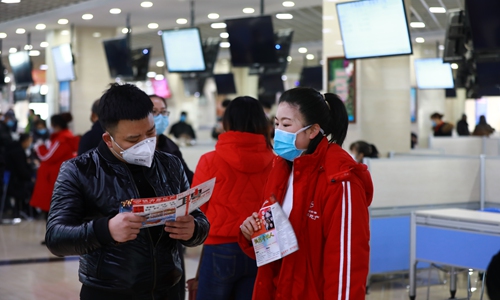China exempts certain social insurance payments, SMEs benefit most
Source:Global Times Published: 2020/4/21 13:33:40

Job seekers at a job fair in Changchun, Northeast China's Jilin Province on March 12 Photo: IC
China has exempted, reduced and delayed certain companies' social insurance payments to the value of 232.9 billion yuan ($32.93 billion) since February, including insurance related to pensions, unemployment and employment injury. Small and medium-sized enterprises (SMEs) benefit most, authorities said.In a bid to stabilize the job market, several departments in China issued the measure on February 20 to ease social insurance payments for enterprises.
Within two months, all provinces have implemented the policy with the total social insurance payment reduction reaching 232.9 billion yuan, including pension insurance at 218.4 billion yuan, unemployment insurance at 7.5 billion yuan and job-related injury insurance at 7 billion yuan, Nie Mingjun, who oversees pension funds at the Ministry of Human Resources and Social Security, told a press conference in Beijing on Tuesday.
"SMEs are the main beneficiaries. SMEs account for 81.3 percent of the 232.9-billion-yuan reduction, with 189.3 billion yuan," Nie said, adding that SMEs also account for 82.5 percent of the pension insurance payment reduction.
Chinese SMEs account for more than 80 percent of urban employment, and thus play a vital role in creating and stabilizing the country's job market.
The urban unemployment rate in China hit 5.9 percent in March, official data revealed on Friday, highlighting the widespread repercussions of the coronavirus pandemic which has created severe challenges for the country's economy and job market.
In the first quarter, 2.29 million new urban jobs were created in China, declining 950,000 year-on-year - a roughly 30 percent drop, according to an official at the ministry.
"Most SMEs are in the manufacturing and services sectors. They are extremely vulnerable to economic downturns that suppress consumers' willingness to spend from home. Slumping foreign orders also impact their revenues. As employment is downsized, millions of migrant workers in China could risk losing their jobs," Cong Yi, a professor at the Tianjin University of Finance and Economics, told the Global Times on Friday.
He suggested policymakers should offer employment subsidies to SMEs to help reduce the cost of hiring workers.
As of April 10, 23 million migrant workers in poor economic condition have left their hometowns to look for urban jobs, accounting for 86 percent of the total number of migrant workers who looked outside their towns to earn a living in the last year, Zhang Ying, director of the Employment Promotion Department of the Ministry, said on Tuesday.
Thus far, 5.9 million migrant workers have been transported using "point-to-point" travel methods like special trains connecting two regions, officials noted.
In order to help ease pressure in the job market and avoid increased numbers of coronavirus cases, the ministry has organized thousands of online recruitment activities together with local governments and enterprises to help job hunters find employment.
As of Thursday, 5,031 online recruitment activities have been opened to new university graduates, migrant workers, urban unemployed applicants and impoverished laborers, Zhang said. About 1.34 million enterprises released positions online for 13.39 million people, and over 7.67 million applicant resumes have been received.
Global Times
Posted in: MARKETS